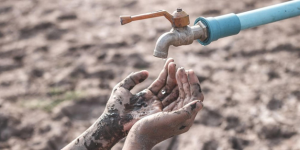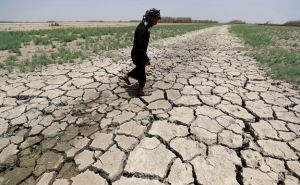Climate change and its impact on water resources
By Fadhel N. Al-Mousawi
Every person and living creature on the world will be affected by the global problem of climate change. The most convincing proof of surface warming comes from widely used temperature records, some of which started at the late 19th century. There is currently temperature monitoring equipment installed at tens of thousands of locations over land and ocean surfaces. Indirect temperature change calculations indicate that, in terms of the average surface temperature of the Earth, the most recent decade, 2010-2019, is the warmest decade. It’s possible that the thirty years from 1989 to 2019 were the warmest in more than 800 years [1]. Millions of people worldwide are already experiencing the impacts of drought, storms, and rising sea levels as a result. Greenhouse gases are released into the atmosphere when fossil fuels like coal, oil, and gas are burned, rapidly warming the Earth’s surface. Climate change has been a major worldwide issue that will affect every living creature on the earth for many decades. We have less than ten years to reduce greenhouse gases in half, according to the most recent UN climate change study [2].

Having access to safe, high-quality drinking water is a fundamental human right, and it is the duty of those in authority to see to it that this right is preserved. The World Health Organization describes water as a “primary tool for enhancing public health” since it considerably improves hygiene and avoids numerous diseases. There are 2.4 million people who do not have access to clean water globally, while more than 1.1 billion people experience water scarcity. The population of the Earth may reach 10 billion in 2050, but freshwater supplies will remain the same. According to the International Monetary Fund, Pakistan (for example) is third with inadequate water and sanitation as 2.1 million people lack access to clean water [3, 4].

Iraq (as another example) is currently one of the countries with a water shortage and is affected strongly by climate change. Residents of southern Iraq’s marshes (which are listed six years ago on the UNESCO World Heritage List) are becoming more concerned every day because of the drop in water levels caused by decreased rivers flow and less rainfall. To prevent a local disaster, we immediately need to alter how to use and manage water. According to experts, the problem requires solutions such as education and research which are essential to inspire new behaviors in order to change the crisis’s understanding. Future water shortages will need a considerable revision of all usage habits. For example, new conservation technologies are required to address the shortage of fresh water. Reusing water is another way to decrease reliance on water imports from abroad. Given that agriculture uses 70% of the freshwater in the world, improving irrigation methods can help reduce supply and demand gaps. Also, for regions with limited freshwater supplies, water catchment systems may be necessary [5]. In conclusion, today, there is an urgent need for large-scale action because water resources are limited and at danger from numerous pressures like climate change. Human health, food security, energy supply, the maintenance of cities, and ecosystems all depend on water.
References
- The Royal Society. 2022; Available from: https://royalsociety.org.
- Ceres. 2022; Available from: https://www.ceres.org/resources/reports.
- Zhang, D., et al., Water scarcity and sustainability in an emerging economy: a management perspective for future. 2020. 13(1): p. 144.
- Qamar, K., et al., Water sanitation problem in Pakistan: A review on disease prevalence, strategies for treatment and prevention. 2022: p. 104709.
- 5 ways to avert a global water crisis. 2022; Available from: https://siwi.org/latest/5-ways-to-avert-a-global-water-crisis/.


























































